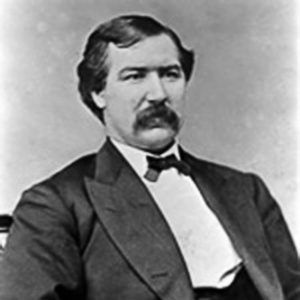calsfoundation@cals.org
Alexander McDonald (1832–1903)
As one of Arkansas’s Republican senators during Reconstruction, Alexander McDonald played a role in the return of the state to its place in the Union. Possibly, though, McDonald’s roles as banker and railroad executive were more important to the state than his brief political career.
Alexander McDonald was born on April 10, 1832, near Lock Haven, Pennsylvania, one of several children of John and Lucy McDonald. He attended Dickinson Seminary in Williamsport, Pennsylvania, and also Lewisburg University in Lewisburg, Pennsylvania, although it appears that he did not graduate from any institution. In 1857, he traveled west to the Kansas Territory and became a businessman. Along with his brother, Benjamin P. McDonald, he ran a sawmill—variously known as “Bowen and McDonald” and “McDonald and Brother”—that soon branched out into freighting and banking. In 1860, he was living in Fort Scott, Kansas, with his wife, Emma C. McDonald, and two daughters, Tacie and Lizzie.
Following the start of the Civil War, McDonald helped to organize a frontier guard at Fort Scott. On May 1, 1861, he was elected captain of Frontier Guard No. 2, but he resigned that position shortly thereafter to serve as a supplier to several Union army units. Later, he was said to have supported three Union regiments, supplying them with materiel and other necessities. After Fort Smith (Sebastian County) was taken by Union forces in September 1863, McDonald was named post sutler, making him the main source of supplies to the Union soldiers. At about the same time, he organized a Fort Smith bank. Under the reign of McDonald and his partner, Perry Fuller, corruption at the fort was rampart, to the extent that Brigadier General James G. Blunt was widely regarded as subservient to the company directors.
McDonald arrived in Little Rock (Pulaski County) not long after it had been taken by Union forces, and, before the end of the war, McDonald had organized the Merchant’s National Bank in Little Rock, of which he was president.
McDonald worked actively to rebuild the industry and economy of Little Rock and of the state of Arkansas after the Civil War. In addition to his banking efforts, he was also vice president of the Little Rock and Fort Smith Railroad and president of the Arkansas Bridge Company, which was organized to construct a bridge across the Arkansas River at Little Rock. This was one of at least three competing companies seeking both private investments and government funding; their efforts in 1869 and 1870 led indirectly to the construction of the Baring Cross Bridge in 1873. Later, McDonald also served as president of the Little Rock and Fort Towson Railroad. At one point, he was considered the richest man in Arkansas. McDonald built a house on Cantrell Road, which was added to the National Register of Historic Places in 1978. According to census records, his family in 1870 included his wife Emily (probably the same woman as Emma in 1860), as well as three daughters (Tacie, Lizzie, and Josephine) and one son (Allison).
While actively engaged in banking and business interests, McDonald also served in the state’s constitutional convention of 1868. Following this convention, the newly assembled state legislature named him, along with Benjamin Franklin Rice, to represent Arkansas in the U.S. Senate. McDonald and Rice were sworn in as senators on June 22, 1868, but McDonald’s term was to end at the conclusion of 1871. During his short term, McDonald’s greatest contribution was probably his support for the impeached President Andrew Johnson; not only did McDonald vote against conviction, but he spoke to persuade other senators to do the same, allowing Johnson to complete his term.
Although McDonald hoped to be reelected by the state legislature to a full term in the Senate, politics back in Little Rock intervened. McDonald was associated with the Brindletail faction of the Republican Party, which was resisting the efforts of Governor Powell Clayton to dominate state politics. When Clayton announced his intention to run for McDonald’s Senate seat, the Brindletails chose to cooperate, hoping to replace Clayton with Lieutenant Governor James Johnson, one of their allies in state government. The resulting confusion ended with Clayton as senator, Ozro Hadley as acting governor, Johnson as secretary of state, and McDonald outside of the government. Discouraged by his failure to continue in politics, McDonald sold his large house and eventually relocated to the New York area around 1874.
McDonald continued to pursue his interest in railroads, and he was commissioned by President Chester Arthur in 1885 to examine the finances of the Northern Pacific Railroad. In 1900, McDonald was living in the New York–area house of his daughter Tacie Harper. McDonald died on December 13, 1903, at his daughter’s house and was subsequently buried at Highland Cemetery in Lock Haven, Pennsylvania.
For additional information:
“Alexander McDonald.” Biographical Directory of the United States Congress. http://bioguide.congress.gov/scripts/biodisplay.pl?index=M000408 (accessed March 8, 2022).
“Former Senator M’Donald Dead.” Arkansas Gazette. December 15, 1903, p. 12.
Steven Teske
Encyclopedia of Arkansas History & Culture
 Alexander McDonald
Alexander McDonald 



Comments
No comments on this entry yet.